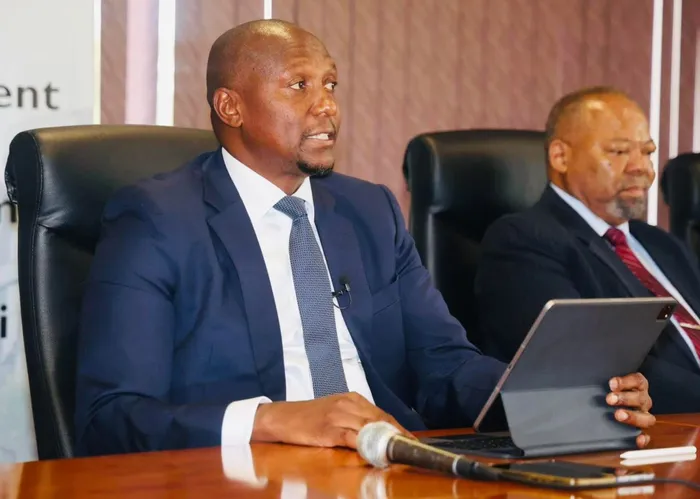South Africa on edge as the US deports criminals to eSwatini
International Relations

eSwatini Prime Minister Russell Dlamini told the country’s Cabinet this week that the basis of the agreement was purely the good relations that existed between eSwatini and the US.
Image: Supplied
THE kingdom of eSwatini has become the focus of regional scrutiny following the arrival of five foreign nationals deported from the United States and transferred to its correctional system — individuals convicted of serious crimes, including murder and child rape.
Held in isolated prison units, these inmates — citizens of Vietnam, Jamaica, Cuba, Laos, and Yemen — were reportedly rejected by their home countries, reportedly prompting the US Department of Homeland Security to describe these offenders in harsh terms.
The eSwatini government confirmed the transfer in a statement released by spokesperson Thabile Mdluli: “Indeed, five inmates are currently housed in our correctional facilities in isolated units, where similar offenders are kept. The government acknowledges the widespread concern regarding the deportation of third-country prisoners from the US into eSwatini.”
When reached for further comments, Mdluli revealed that the government could accommodate additional deportees beyond the initial five, depending on further discussions and available capacity. Officials confirmed there were no set timelines for repatriating the deported prisoners, as the process depended on cooperation with their countries of origin.
Government representatives reported that some home countries had expressed willingness to accept their nationals back. Mdluli said while eSwatini had sought regional support regarding the deportations security implications, coordination has not specifically involved the Southern African Development Community (Sadc).
She further said: “This exercise is the result of months of robust high-level engagements… The two governments will collaborate with the International Organisation for Migration (IOM) to facilitate the transit of these inmates to their countries of origin. The engagements considered every avenue, including rigorous risk assessments and careful consideration for the safety and security of citizens.”
Prime Minister Russell Dlamini told the country’s Cabinet this week that the basis of the agreement was purely the good relations that existed between eSwatini and the US. “eSwatini also has relations with the countries of origin for the deportees. Their coming to eSwatini will benefit the country bilaterally through improved relationships between the current administrations.
“Deportees will benefit in that they will be repatriated home, and their relatives will be able to visit them. Already, some countries have reached out to say it is not true that they rejected them. Hence, the eSwatini government will expedite repatriation to such countries, albeit within laid-down international migration processes and agreements.”
Dlamini said the agreement between eSwatini and the US regarding the deportees promoted mutual interests of both parties. “The eSwatini government will not spend financial resources in catering for the inmates. All expenses are being catered for by the US Government. In this light, there is neither financial gain nor loss to the government.
“The deportees do not pose any threat to the citizens of the country, let alone to our neighbours. We continue to request calm.”
Mdluli said all agreements were made with due regard for sovereignty, human rights, and international law. “As a responsible member of the global community, eSwatini adheres to international agreements and diplomatic protocols regarding the repatriation of individuals, ensuring that due process and respect for human rights are followed.”
Yet, no public timeline exists for the inmates’ repatriation, and the full terms of the agreement remain confidential.
Notably, the IOM denied involvement but offered support: “The IOM has not been involved in the removal of the migrants from the US to eSwatini and has not been contacted to assist with their repatriation. However, IOM stands ready to support member states, upon request and where operationally feasible, in line with its humanitarian mandate.”
eSwatini, a landlocked nation of just about 1.4 million people, shares extensive borders with South Africa, raising concerns about cross-border mobility. South African officials, as reported by CNN on July 17, voiced alarm, citing the “porous border” and warning that some inmates might eventually attempt to enter South Africa.
“Everyone knows that these fellows (the deported convicts) will want to move to South Africa”, a diplomatic source was quoted as saying, adding that the US “did [ask South Africa to accept migrants] and we refused.
“There is a feeling that some inside the Trump administration could be using [the deportation of prisoners to eSwatini] to destabilise South Africa,” given its porous borders and Eswatini’s struggling economy. The source said the deportations to eSwatini were a provocation by the US and a direct national security threat.
Critics argued the decision to reroute them to eSwatini reflected a broader pattern of offloading responsibility onto African nations. Lucky Lukhele of Swazi Solidarity, a South Africa-based civil rights group, condemned the move: “It is blatant racism to assume Africa is a dumping ground for Trump.”
Human rights advocates and opposition leaders, as reported by CNN, echoed these concerns. They warned that eSwatini’s prison system, already strained by overcrowding and limited capacity, might be ill-equipped to manage additional high-risk detainees. The People’s United Democratic Movement (Pudemo) also denounced the transfer as a threat to communities already grappling with violent crime.
Regional silence has deepened the unease. Neither Sadc, nor the South African government has issued an official statement on the matter.
With the Prime Minister signalling continued cooperation with the US but no further details on future transfers, the long-term implications for regional safety, justice, and diplomacy remain uncertain and deeply contested.